Digital marketing isn’t just about creativity anymore—it’s about wielding the right tools to cut through the noise and deliver results that keep clients coming back. You’re not here for fluffy promises or generic rundowns. You need a tech stack that turns chaos into control, and I’m here to walk you through it, step by step, like we’re hashing this out over coffee.
We’re not just listing tools—we’re tackling your pain points head-on. You’ve got multiple accounts to manage, ROI to justify, workflows to streamline, and trends that shift faster than you can say “algorithm update.”
The tools in this guide are battle-tested, curated for 2025, and broken down into categories that match your real-world needs—whether you’re deep in social media, PPC, SEO, or running a full-service shop. Let’s find what works for you and why it matters.
Social Media Management and Reporting Tools
Modern marketing agencies require powerful social tools to control multiple accounts, plan content, measure results, and showcase client value effectively.
Sprout Social – The All-in-One Powerhouse
Sprout Social dominates the social media management space, earning its #1 G2 ranking and securing trust from 30,000+ global brands.
Key Strengths:
- Comprehensive analytics with customizable reports
- AI-powered workflows for streamlined content creation and approval
- Unified inbox centralizing client engagements across platforms
- Seamless Salesforce integration
- Complete scheduling, engagement, and reporting capabilities across networks
Sprout Social excels at complex agency requirements while maintaining interface simplicity. The Smart Inbox feature consolidates all social messages into one manageable stream, allowing teams to prioritize and respond efficiently. Agencies particularly value the platform’s reporting tools that create branded client presentations with clear performance metrics.
Real results prove Sprout Social’s effectiveness—Trek Bikes achieved a 1,002% increase in social engagements after implementation.
Considerations: The platform costs $249/month minimum, making it a substantial expense for smaller operations. Users sometimes face challenges mastering certain features, and the analytics occasionally miss depth for specialized campaign requirements.
Ideal for: Medium to large agencies overseeing multiple client accounts who require robust analytics and efficient workflow systems.
Check out our full breakdown of the best social media reporting tools.
Hootsuite – The Veteran Platform with Unmatched Integration
Hootsuite stands as a social media management titan with 16 years of market presence and 25+ million active users.
Key Strengths:
- 100+ app integrations creating a centralized social hub
- Intuitive dashboard for multi-channel management
- AI tools that enhance content creation and scheduling
- Mass content deployment (350 posts simultaneously)
- Sophisticated listening capabilities for brand mention tracking
Hootsuite transforms complicated social operations into streamlined processes. The platform’s central dashboard displays all social activities clearly, while advanced scheduling enables months of content planning. Extensive integration options eliminate platform-switching, improving workflow efficiency.
Proof of performance comes from the Regional Municipality of Wood Buffalo, which achieved 500%+ growth across social channels after adopting Hootsuite.
Considerations: The platform costs $99/month minimum with annual commitment (the free plan ended March 2023), creating barriers for new agencies. Users occasionally encounter technical issues with scheduled posts, and despite comprehensive analytics, specialized campaigns sometimes require deeper metrics.
Ideal for: Agencies managing diverse social campaigns who prioritize system integration and operational simplicity.
Later Social – The Visual Content Specialist
Later Social dominates the visual marketing niche, establishing itself as the premier platform for Instagram and TikTok-focused agencies.
Key Strengths:
- Visual calendar interface for intuitive content planning
- Deep Instagram and TikTok platform integration
- Traffic-driving Link in Bio functionality
- Smart hashtag recommendations powered by AI
- Visual storytelling-optimized user interface
Later Social revolutionizes content planning through its visual-first approach. Teams drag and drop images directly onto calendar slots, creating cohesive visual narratives without text-heavy planning documents. The platform’s Link in Bio tool delivers exceptional value, transforming standard posts into shoppable content that drives website traffic from Instagram.
Considerations: The platform primarily supports visual-focused networks, offering less comprehensive coverage than competitors. Analytics capabilities continue to improve but remain less robust than Sprout Social or Hootsuite options. Free accounts face significant limitations, and team collaboration features need enhancement.
Ideal for: Agencies delivering visual marketing strategies, especially for clients heavily invested in Instagram and TikTok campaigns.
Agorapulse – The Customer Support Champion
Agorapulse distinguishes itself through award-winning support services and precise social media ROI measurement tools.
Key Strengths:
- Unified social inbox centralizing all platform interactions
- Automated reporting systems that showcase clear value metrics
- Dedicated social ROI calculation capabilities
- Straightforward interface requiring minimal training
- Responsive, solution-focused customer support team
Agorapulse simplifies complex social processes while maintaining advanced functionality. The shared inbox promotes team efficiency through clear assignment protocols and internal commenting systems that prevent duplicate work. Reporting functions stand out with customizable metrics that highlight specific client priorities through automated delivery systems.
Considerations: The entry-level subscription offers reasonable pricing, but critical features often require higher-tier plans, creating scaling challenges for growing agencies. Platform performance occasionally lags during high-traffic periods.
Ideal for: Agencies valuing responsive customer support and requiring concrete ROI measurements for client presentations.
Buffer – The Streamlined Solution
Buffer delivers streamlined social media management focused on essential functions without feature bloat or unnecessary complexity.
Key Strengths:
- Clean interface requiring minimal training time
- Smart content suggestions powered by AI
- Budget-friendly pricing tiers
- Dependable post scheduling system
- Clear, adaptable analytics reports
Buffer excels through calculated simplicity. The platform masters critical functions like content scheduling and performance measurement instead of attempting comprehensive coverage. AI-driven content recommendations maintain posting consistency without quality sacrifice, suggesting optimal content types and timing based on historical performance data.
Considerations: The platform lacks advanced capabilities found in premium alternatives, particularly social listening and collaborative team features. Analytics provide clarity but miss depth required for sophisticated campaign analysis.
Ideal for: Small agencies and new businesses seeking affordable, straightforward social media management solutions.
Sendible – The White-Label Specialist
Sendible meets the agency need for seamless branding and client-facing professionalism throughout the social media management process.
Key Strengths:
- Complete white-label customization options
- Mass content scheduling tools
- Broad platform integration capabilities
- Intuitive operational interface
- Competitive pricing compared to enterprise alternatives
Sendible delivers exceptional white-label functionality, enabling complete brand customization across reports, dashboards, and client portals. This branding consistency creates professional impressions that strengthen client relationships. The platform also features robust scheduling tools with a content library that facilitates effective repurposing of successful content across multiple accounts.
Considerations: Video scheduling occasionally presents technical challenges, and Instagram capabilities lack the depth found in specialized platforms like Later Social. The interface functions well but appears less refined than premium competitors.
Ideal for: Agencies requiring white-label presentation options while seeking affordable comprehensive solutions.
Zoho Social – The CRM Integration Expert
Zoho Social specializes in connecting social media management with the broader Zoho ecosystem, creating particular value through CRM integration.
Key Strengths:
- Direct CRM connectivity for social lead tracking
- AI-powered content assistant
- SmartQ timing optimization for maximum engagement
- Sophisticated analytics and reporting tools
- Comprehensive platform functionality
Zoho Social transforms social media into a powerful lead generation tool through its CRM integration capabilities. Teams track complete customer journeys from initial social engagement through final conversion, gaining valuable insights into campaign performance and attribution.
Considerations: Entry-level subscriptions restrict channel access, creating challenges for agencies managing varied social presences. Customer support response times occasionally lag behind competitors like Agorapulse.
Ideal for: Existing Zoho ecosystem users and agencies prioritizing social-to-sales tracking capabilities.
Sprinklr – The Enterprise Solution
Sprinklr delivers enterprise-grade social media management designed for large-scale operations with complex requirements.
Key Strengths:
- Deep social listening capabilities across platforms
- AI-driven insights and strategic recommendations
- Competitive intelligence gathering tools
- Team collaboration systems for large organizations
- Enterprise security protocols and compliance features
Sprinklr manages complex social operations across multiple brands, regions, and languages. Advanced AI capabilities generate predictive insights and automate responses, enabling efficient management of high-volume social interactions without proportional staff increases.
Considerations: The platform requires significant learning investment and comes with premium pricing that excludes many smaller agencies. Implementation demands substantial resources and often specialized training.
Ideal for: Large agencies serving enterprise clients with multinational, multi-brand social media requirements.
Statusbrew – The Collaboration Specialist
Statusbrew maximizes team efficiency in social media management through specialized collaboration tools designed for distributed workforces.
Key Strengths:
- Central social inbox unifying all platform engagements
- Team coordination and permission management systems
- Cross-platform content scheduling tools
- Audience targeting and segmentation capabilities
- Task automation for repetitive processes
Statusbrew creates efficient team environments through role-based permissions, structured approval workflows, and internal communication systems. The unified inbox consolidates messages from all connected networks, ensuring consistent response times and service quality regardless of platform.
Considerations: The pricing structure creates confusion with critical features distributed across multiple tiers. Content creation capabilities lack refinement compared to competitors, often requiring additional specialized tools.
Ideal for: Agencies with remote or distributed teams requiring strong collaboration tools and engagement systems.
Swydo – The Client Reporting Automation Expert
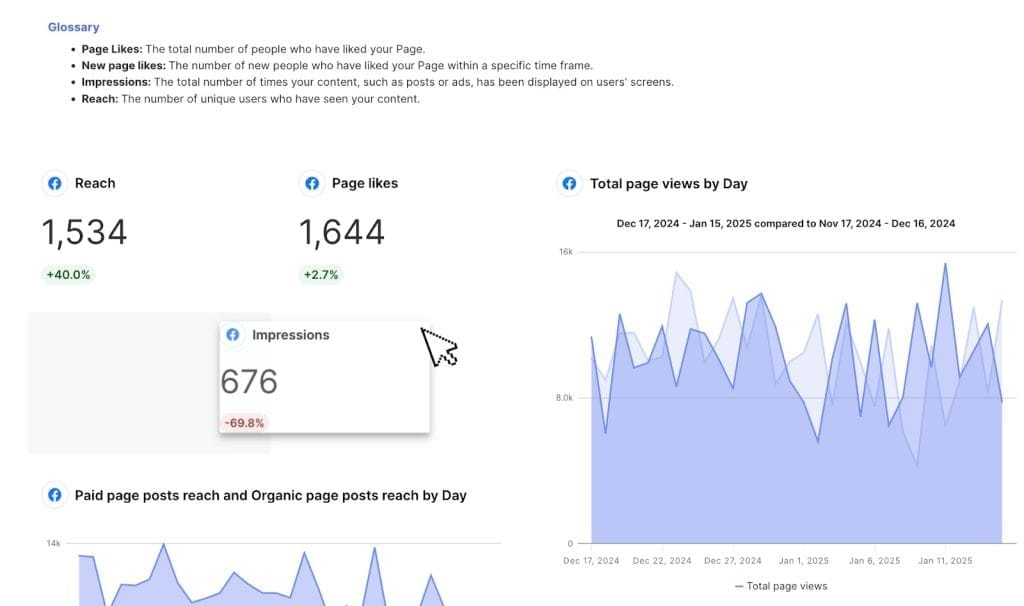
Swydo specializes in marketing report automation rather than direct social media management functionality.
Key Strengths:
- Multi-platform automated reporting
- Live KPI monitoring systems
- Customizable report design templates
- Time-efficient automation capabilities
- Cross-channel data integration beyond social platforms
Swydo consolidates metrics from diverse marketing channels including social media, PPC, SEO, and email into unified, branded reports. This integration provides exceptional value for full-service agencies needing to demonstrate comprehensive performance across client campaigns.
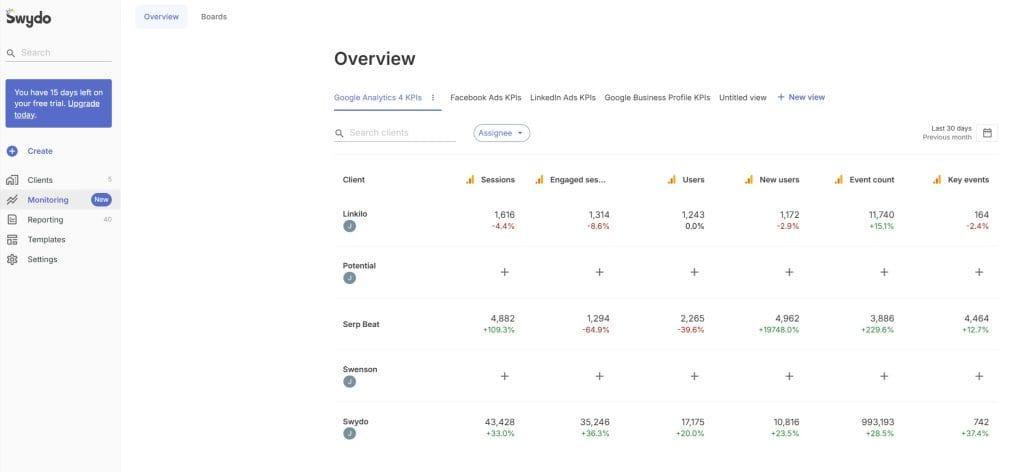
Considerations: The platform requires pairing with other marketing agency tools since it focuses exclusively on reporting and integration with these tools.
Ideal for: Data-focused agencies managing multiple marketing channels who need streamlined client reporting systems.
SEO and Content Marketing Tools
Successful marketing agencies require specialized tools that extend beyond social media. Discover the essential SEO and content marketing platforms delivering measurable organic results.
Ahrefs – The Backlink Analysis Leader
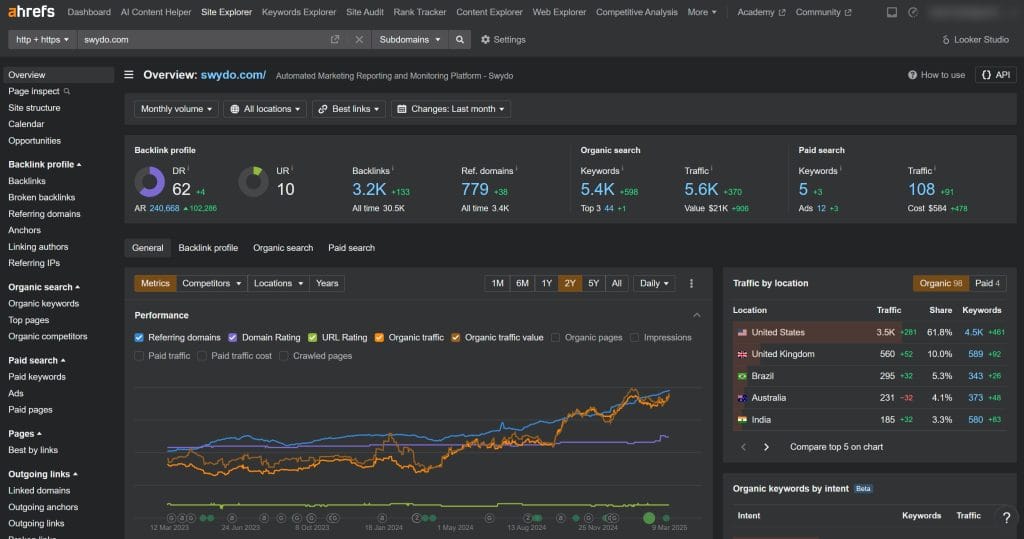
Ahrefs dominates backlink analysis while offering comprehensive SEO capabilities across multiple dimensions.
Key Strengths:
- Market-leading backlink metrics and analysis
- Extensive keyword database with competition metrics
- Content explorer identifying top-performing industry content
- Technical SEO audit tools uncovering site issues
- Competitive intelligence revealing traffic sources and strategy
Ahrefs provides unmatched backlink profile visibility, helping teams discover link building opportunities and evaluate competitor approaches. Site Explorer reveals precise traffic acquisition pathways, displaying organic keyword rankings alongside historical performance visualization.
Considerations: Plans start at $99/month with basic plan restrictions, representing a substantial investment. The platform requires more learning time than some alternatives, though recent interface updates improve usability.
Ideal for: SEO-focused agencies prioritizing backlink strategies and competitive research as central campaign elements.
Semrush – The SEO Swiss Army Knife
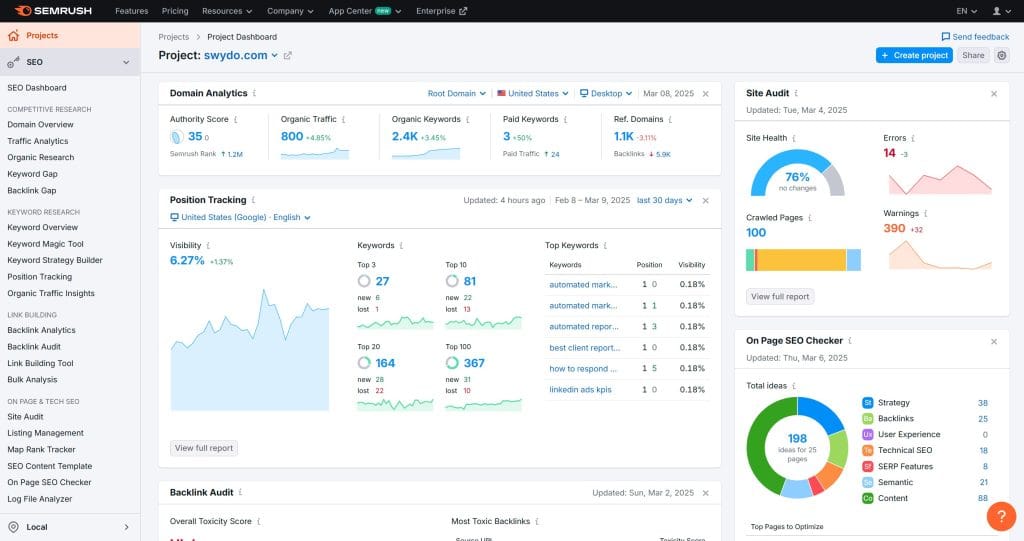
Semrush delivers comprehensive SEO capabilities through 50+ specialized tools within a unified interface.
Key Strengths:
- Powerful keyword research systems identifying valuable opportunities
- Multi-dimensional competitive analysis tools
- Content optimization with AI-driven recommendations
- Link building resources including backlink investigation
- Technical audit capabilities detecting site issues
Semrush excels at delivering actionable SEO insights across the entire optimization spectrum. Keyword research tools uncover valuable ranking opportunities while position tracking monitors performance evolution. The content marketing toolkit provides exceptional value for agencies, offering topic discovery, writing assistance, and content auditing within a single platform.
Considerations: Subscriptions start at $129.95/month, requiring significant budget allocation. The platform’s extensive capabilities create initial complexity for new users, and certain specialized tools lack the depth found in dedicated alternatives.
Ideal for: Full-service agencies offering comprehensive SEO services who require all-in-one research, implementation, and reporting capabilities.
SE Ranking – The Comprehensive SEO Platform
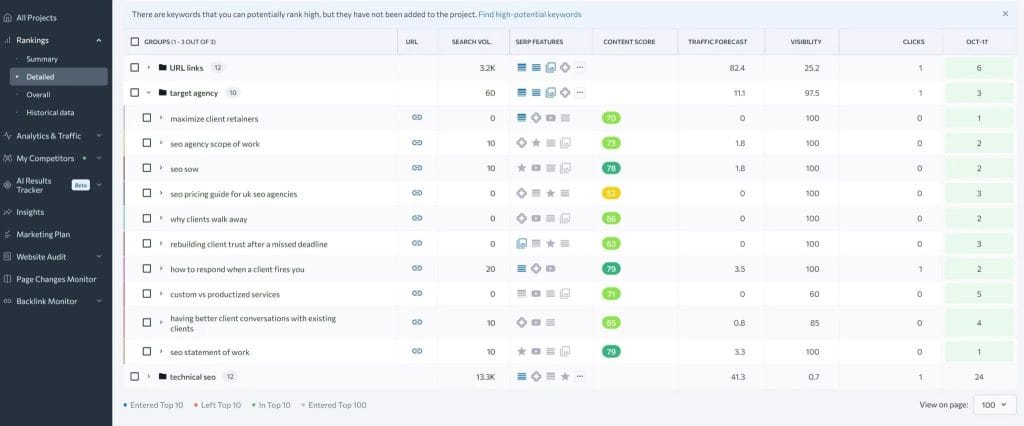
SE Ranking delivers complete SEO campaign management with exceptional white-label capabilities for agencies.
Key Strengths:
- White-label reporting with complete branding customization
- Competitor SEO analysis with gap identification
- Website audit tools detecting technical issues
- Keyword rank tracking with local and mobile options
- Backlink monitoring with acquisition suggestions
SE Ranking equips agencies with complete SEO management capabilities under their own branding. The platform’s white-label dashboard provides clients with real-time performance metrics that showcase agency expertise. The competitive analysis tools reveal specific optimization opportunities based on competitor weaknesses.
Considerations: Some advanced features offered by enterprise SEO platforms require workarounds. API access limitations on lower-tier plans restrict custom integration options.
Ideal for: SEO-focused agencies seeking comprehensive tools with powerful white-label client reporting capabilities.
Screaming Frog – The Technical SEO Essential
Screaming Frog’s SEO Spider application crawls websites with unmatched thoroughness to identify technical optimization opportunities.
Key Strengths:
- Complete technical SEO auditing capabilities
- Adaptable crawling parameters
- Detailed issue and opportunity reporting
- Google Analytics and Search Console integration
- Site architecture visualization tools
Screaming Frog identifies technical barriers to SEO success, from broken links and redirect chains to duplicate content and missing metadata. The tool offers free crawling for up to 500 URLs, making it accessible to agencies of all sizes, while the premium version removes these limitations for larger sites.
Considerations: The desktop application presents a steeper learning curve than web-based alternatives, and the utilitarian interface prioritizes functionality over aesthetics. The focus on technical aspects requires complementary tools for complete SEO management.
Ideal for: Agencies providing technical SEO services requiring thorough site analysis and issue detection.
Clearscope – The Content Optimization Specialist
Clearscope harnesses AI to analyze high-ranking content and generate optimization recommendations that improve search visibility.
Key Strengths:
- AI-driven content enhancement technology
- Thorough keyword analysis
- Competitive content assessment
- Content performance monitoring
- Google Docs and WordPress compatibility
Clearscope transforms content creation through data-driven optimization. The platform analyzes top search results and offers actionable improvement strategies, suggesting relevant terms, optimal content length, and readability enhancements based on current ranking patterns.
Considerations: Premium pricing starts at $170/month, focused specifically on content optimization. The specialized nature means agencies still require separate tools for broader SEO functions.
Ideal for: Content-focused agencies demanding search-optimized deliverables with measurable performance improvements.
Surfer SEO – The On-Page Optimization Tool
Surfer SEO delivers data-driven content optimization based on comprehensive analysis of top-performing search results.
Key Strengths:
- Live content editing guidance
- SERP analysis revealing competitive insights
- Content planning for topic clusters
- Keyword research capabilities
- Google Docs integration
Surfer SEO excels in real-time content enhancement. Writers receive immediate feedback on keyword usage, content structure, and other ranking factors while creating client deliverables. This simultaneous editing and optimization approach streamlines the content production process.
Considerations: The platform focuses exclusively on on-page factors, requiring additional tools for comprehensive SEO strategies. The data-driven guidelines sometimes constrain creative approaches to content development.
Ideal for: Content production agencies seeking to guarantee search optimization in every client deliverable.
BuzzSumo – The Content Research Powerhouse
BuzzSumo uncovers trending topics, successful content formats, and influential creators in targeted niches.
Key Strengths:
- Content trend identification across platforms
- Influencer discovery and outreach tools
- Content performance analysis with engagement metrics
- Backlink and brand mention monitoring
- Question analyzer for content idea generation
BuzzSumo reveals exactly what content resonates with specific audiences. The content analyzer identifies the most-shared and engaged content across social platforms, while the question analyzer discovers common inquiries related to any topic—ideal for creating highly relevant client content.
Considerations: The platform specializes in content research and social performance metrics, complementing rather than replacing traditional SEO tools. Data coverage occasionally shows limitations in highly specialized industry sectors.
Ideal for: Content marketing agencies focusing on thought leadership who require data-driven insights for topic selection and format decisions.
Google Search Console – The Essential Free SEO Tool
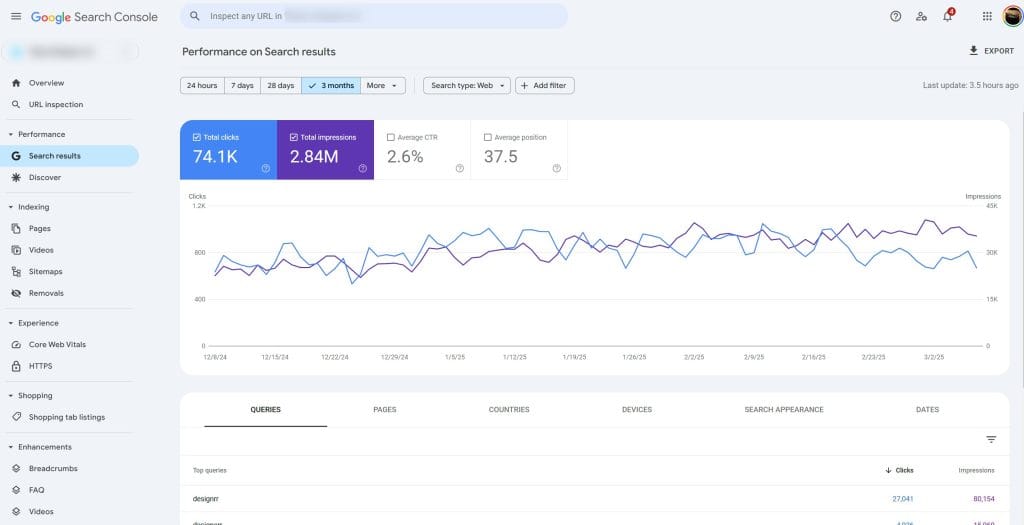
Google Search Console provides direct insights into how Google evaluates and indexes client websites.
Key Strengths:
- Direct Google search data integration
- Query and page performance metrics
- Technical issue alerts and notifications
- Mobile usability analysis
- Index status and URL inspection capabilities
Google Search Console delivers critical SEO information directly from Google itself. The platform displays exactly which search terms drive traffic, flags technical problems affecting search visibility, and enables immediate submission of new content for indexing.
Considerations: Despite immense value, the tool lacks competitive analysis features found in paid alternatives. The Google-exclusive focus requires supplementary tools for comprehensive search engine coverage.
Ideal for: Every agency managing client websites must implement this foundational tool regardless of which other SEO platforms they employ.
Morning Score – The Budget-Friendly SEO Solution
Morning Score offers core SEO capabilities at price points accessible to smaller agencies and startups.
Key Strengths:
- Cost-effective pricing structure
- Straightforward interface requiring minimal training
- Essential keyword research and tracking functions
- Website audit capabilities identifying common issues
- Competitor performance monitoring
Morning Score democratizes SEO tools for agencies with limited budgets, focusing on fundamental capabilities without overwhelming complexity. The platform’s clear reporting helps communicate progress to clients in easily understood formats.
Considerations: The tool provides less depth and fewer advanced features than enterprise platforms like Semrush or Ahrefs. Data coverage may show limitations in specialized or international markets.
Ideal for: Small agencies and startups seeking affordable entry-level SEO tools without enterprise-level complexity or cost barriers.
Here’s AccuRanker in the same style and structure as the other tools:
AccuRanker – The Precision Rank Tracking Specialist
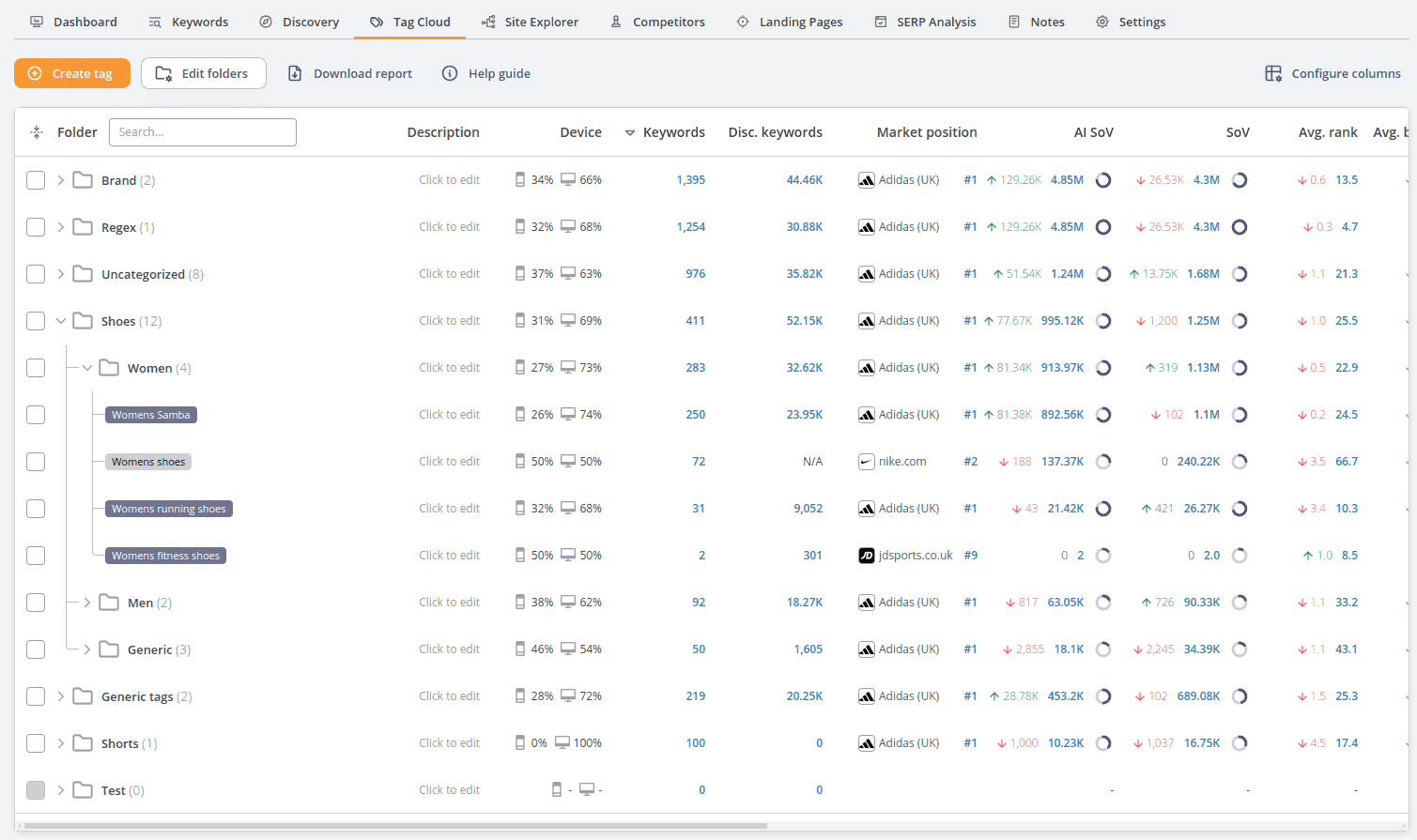
AccuRanker delivers industry-leading search ranking data with unmatched accuracy and refresh rates.
Key Strengths:
- On-demand ranking updates providing real-time position data
- Exceptional local and mobile rank tracking precision
- Share of voice measurement quantifying market dominance
- Landing page performance correlation with rankings
- Advanced competitor tracking with SERP feature monitoring
AccuRanker provides agencies with the fastest, most accurate ranking data available. The platform’s on-demand refresh capability reveals immediate ranking changes following optimization efforts, eliminating waiting periods for actionable insights. The competitive intelligence tools measure exact market position across all ranking factors, including SERP features and local pack inclusion.
Considerations: The specialized focus means agencies need additional tools for comprehensive SEO management. Higher refresh rates and data volume increase costs compared to general-purpose SEO platforms.
Ideal for: Data-driven SEO agencies requiring absolute precision in rank tracking with immediate visibility into algorithm-driven position changes.
Check out our full breakdown of the best SEO monitoring and the best SEO reporting tools article.
PPC and Paid Media Tools
Effective paid media management requires specialized platforms for campaign optimization and performance tracking. Discover the essential tools powering successful agency media operations.
Google Ads – The PPC Foundation
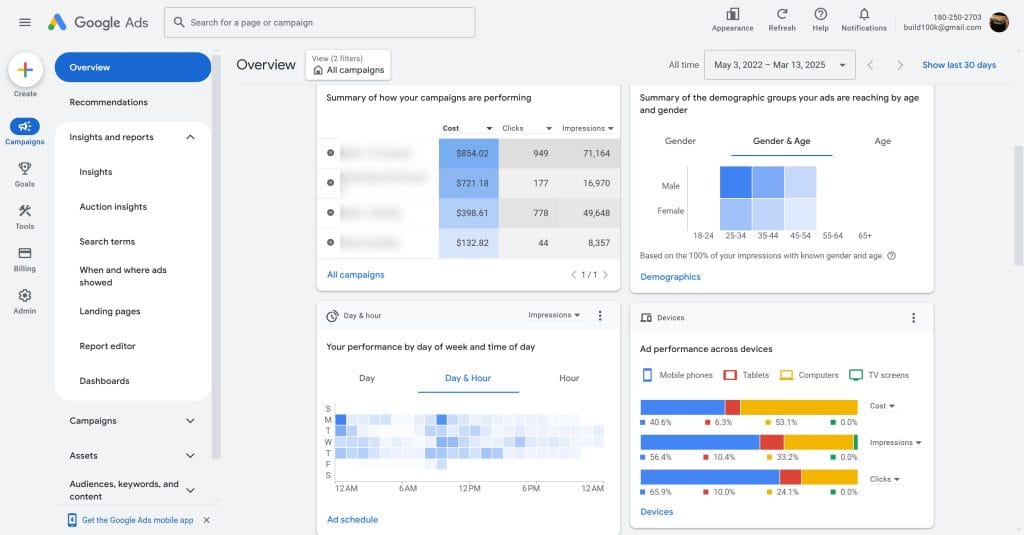
Google Ads provides unmatched reach and targeting capabilities as the cornerstone of most digital advertising strategies.
Key Strengths:
- Massive reach across Google’s search, display, video, and shopping networks
- Precise audience targeting using demographics, interests, and intent signals
- Advanced machine learning bidding optimization
- Google Analytics integration for conversion tracking
- Diverse campaign types addressing varied marketing objectives
Google Ads equips agencies with multiple campaign formats to address specific client goals, from immediate lead generation to brand awareness building. The platform’s machine learning capabilities continue evolving, offering automated bidding strategies that optimize toward client business outcomes.
Considerations: Platform complexity creates learning challenges for newcomers, while increasing competition drives up costs across many industries. Effective management demands continuous education to master frequent feature updates.
Ideal for: Nearly all agencies offering paid media services, as Google Ads forms the foundation of most comprehensive digital advertising strategies.
Google Ads Editor – The Essential PPC Tool
Google Ads Editor provides a desktop application for bulk campaign management and editing without browser limitations.
Key Strengths:
- Offline editing capabilities for campaign assets
- Mass changes across multiple accounts or campaigns
- Advanced search and filtering options
- Error detection before publishing changes
- Version history with account snapshots for safety
Google Ads Editor dramatically increases efficiency for agencies managing multiple ad accounts. The ability to make bulk changes and work offline before publishing offers substantial time savings for PPC specialists handling complex account structures.
Considerations: The tool works exclusively with Google Ads, requiring separate solutions for other platforms. Some users find the interface less intuitive than web-based alternatives, though functionality typically outweighs these concerns.
Ideal for: Any agency managing Google Ads campaigns, particularly those handling multiple client accounts or large-scale campaign structures.
Optmyzr – The PPC Automation Platform
Optmyzr delivers AI-powered optimization and management tools specifically designed for PPC campaign enhancement.
Key Strengths:
- Automated optimization recommendations based on performance data
- Single-click improvements for routine optimization tasks
- Comprehensive reporting capabilities with visualization
- Multi-platform management across Google, Microsoft, and Facebook
- White-label reporting options for client presentations
Optmyzr identifies optimization opportunities that manual analysis might miss, from bid adjustments to ad copy enhancements. The automation capabilities provide exceptional value for agencies managing multiple accounts, enabling efficient optimization at scale without proportional time investment.
Considerations: This specialized tool adds costs beyond the ad platforms themselves. Certain features require learning investment, though the time savings justify this initial effort for most agencies.
Ideal for: Agencies handling substantial PPC account responsibilities seeking efficiency improvements and performance gains.
Wordstream – The PPC Management Solution
Wordstream simplifies and enhances PPC campaign management across multiple advertising platforms.
Key Strengths:
- Performance grader providing quick account assessment
- Landing page optimization tools increasing conversion rates
- Alert systems for immediate account issue identification
- Multi-platform campaign management capabilities
- Client-friendly reporting templates
Wordstream’s PPC Advisor delivers actionable insights for campaign performance improvement, focusing on making complex optimizations accessible to users with varied experience levels. The landing page tools ensure clicked ads convert effectively, improving overall campaign ROI metrics.
Considerations: Advanced PPC specialists sometimes find the simplified approach restricts complex strategy implementation. The accessibility focus occasionally sacrifices depth in specialized areas.
Ideal for: Agencies with diverse PPC expertise levels who need consistent performance across all client accounts.
Unbounce – The Landing Page Optimizer
Unbounce specializes in creating and testing high-converting landing pages, critical for PPC campaign success.
Key Strengths:
- Intuitive drag-and-drop page builder requiring no coding
- Comprehensive A/B testing capabilities
- AI-powered conversion recommendations
- Integration with major marketing and analytics platforms
- Mobile-responsive design capabilities
Unbounce empowers agencies to create conversion-focused landing pages without development resources. The Smart Traffic feature automatically directs visitors to landing page variants most likely to convert based on their characteristics, improving campaign performance metrics.
Considerations: This specialized landing page platform adds another cost element to the marketing technology stack. Design flexibility sometimes restricts creative vision compared to custom-coded solutions.
Ideal for: Agencies prioritizing conversion rate optimization who need efficient landing page creation and testing capabilities.
Microsoft Advertising – The Underestimated Alternative
Microsoft Advertising provides valuable search traffic beyond Google, reaching users throughout the Microsoft network ecosystem.
Key Strengths:
- Access to Bing, Yahoo, DuckDuckGo, and Microsoft partner sites
- Reduced competition with lower cost-per-click in many sectors
- Audience demographics targeting professionals and higher-income segments
- Google Ads campaign import functionality for efficient cross-platform management
- LinkedIn profile targeting for precision B2B campaign delivery
Microsoft Advertising delivers access to valuable audience segments that complement Google campaigns. The platform often produces superior ROI in certain industries, particularly those targeting professional audiences or mature demographic groups.
Considerations: The platform reaches fewer total users than Google, positioning it better as a complementary channel than a standalone solution. New features sometimes arrive later than their Google counterparts.
Ideal for: Agencies diversifying paid search strategies to access additional qualified traffic at competitive rates.
Amazon Advertising – The E-Commerce Essential
Amazon Advertising has emerged as a critical platform for product-focused clients, offering direct access to active shoppers.
Key Strengths:
- Direct connection to customers actively searching for products
- Diverse ad formats including Sponsored Products, Brands, and Display
- Precise targeting based on shopping behavior and product categories
- Sales-focused attribution and analytics
- Expanding reach through Amazon’s growing publisher network
Amazon Advertising connects clients directly with consumers at their purchasing decision point. The platform’s focus on shopping intent makes it exceptionally valuable for direct response campaigns with measurable ROI metrics.
Considerations: The platform exclusively benefits product-based businesses, particularly those already selling on Amazon. Increased seller adoption has intensified competition, raising costs across popular categories.
Ideal for: Agencies serving e-commerce clients needing to establish or expand presence on the world’s largest online marketplace.
Facebook Ads – The Social Advertising Giant
Facebook Ads dominates social advertising through unmatched targeting capabilities based on user interests and behaviors.
Key Strengths:
- Precision audience targeting using interests, behaviors, and demographics
- Versatile ad formats from stories to carousels to video content
- Powerful remarketing capabilities for audience nurturing
- Access to Instagram and Facebook Marketplace inventory
- Effective performance for both brand awareness and conversion campaigns
Facebook Ads excels at delivering targeted messaging to specific audience segments across its massive user base. The visual-focused platform proves particularly effective for industries requiring product demonstration or lifestyle positioning in their marketing.
Considerations: Recent privacy changes, particularly Apple’s iOS updates, have impacted tracking capabilities and attribution. Creative freshness demands frequent asset updates to combat ad fatigue.
Ideal for: Agencies managing campaigns for clients with strong visual offerings and defined audience targeting parameters.
LinkedIn Ads – The B2B Specialist
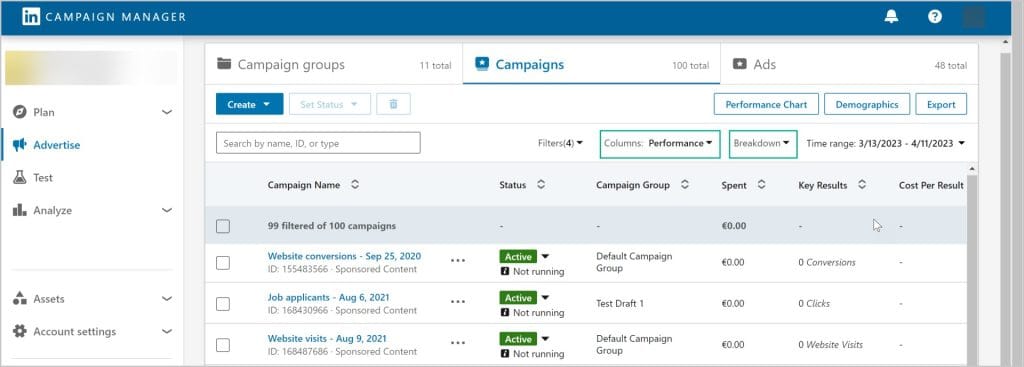
LinkedIn Ads delivers unrivaled B2B targeting capabilities based on professional attributes and company characteristics.
Key Strengths:
- Targeting selection by job title, company size, industry, seniority, and skills
- Professional context aligning with B2B messaging
- Multiple format options including Sponsored Content, InMail, and video
- Account-based marketing features for enterprise sales approaches
- Lead generation forms pre-populated with professional profile data
LinkedIn Ads connects campaigns with decision-makers in specific companies and industries. The platform’s professional environment ensures business messages appear where users actively consider professional challenges and solutions.
Considerations: Cost-per-click rates exceed most alternative platforms, requiring careful budget management. The audience focuses more on professional development than immediate purchases, affecting conversion timelines.
Ideal for: Agencies serving B2B clients with higher-value products or services where reaching specific decision-makers justifies premium acquisition costs.
I’ll create entries for CallRail, CallTrackingMetrics, AdRoll, Salesforce, and SE Ranking in the same style, structure, format, and tone as the existing tools in the article.
CallRail – The Conversation Intelligence Platform
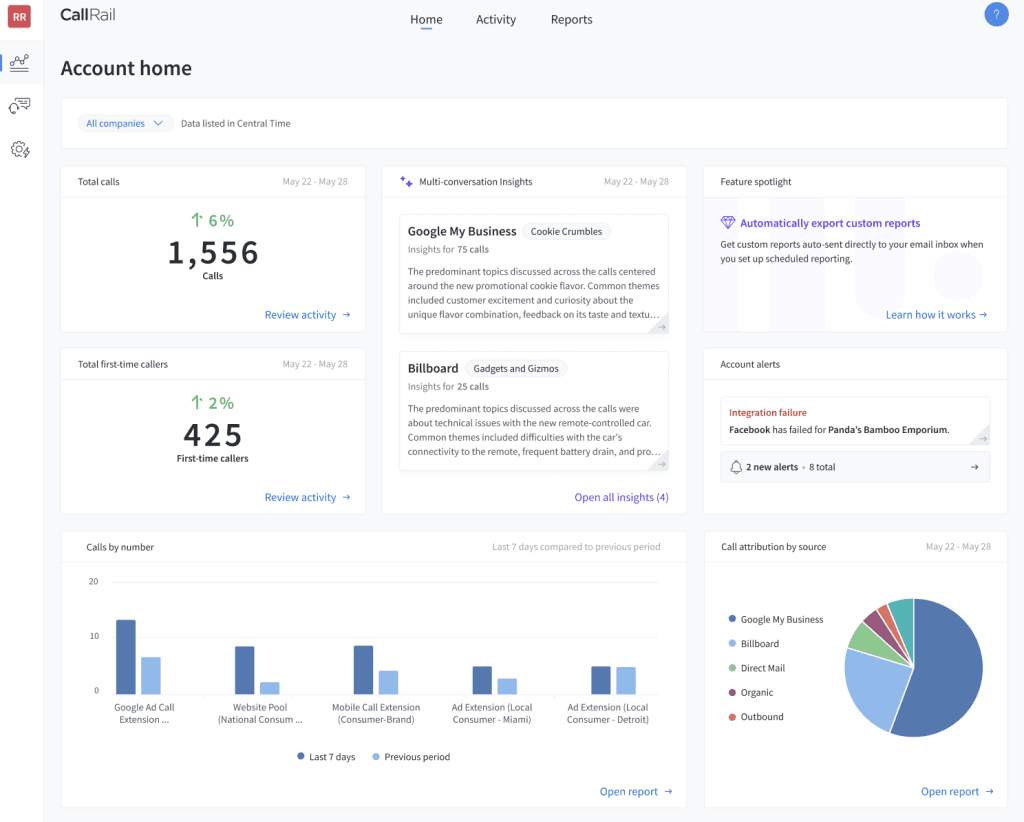
CallRail transforms phone calls into actionable marketing insights with advanced tracking and analytics capabilities.
Key Strengths:
- Precise call attribution across marketing channels
- Dynamic number insertion for website visitor tracking
- Conversation intelligence with AI-powered call analysis
- Form tracking integration for complete lead journey mapping
- Multi-location call routing and management
CallRail connects offline conversions to digital marketing efforts, solving a critical attribution challenge. The platform automatically records, transcribes, and analyzes calls, identifying qualified leads and revealing which marketing tactics drive valuable phone conversations. Custom scoring rules flag high-priority opportunities requiring immediate follow-up.
Considerations: Setup requires technical implementation for maximum value. Some advanced conversation intelligence features command premium pricing beyond basic call tracking.
Ideal for: Agencies managing clients who rely on phone calls for lead generation and need precise attribution of marketing-driven conversations.
CallTrackingMetrics – The Omnichannel Attribution System
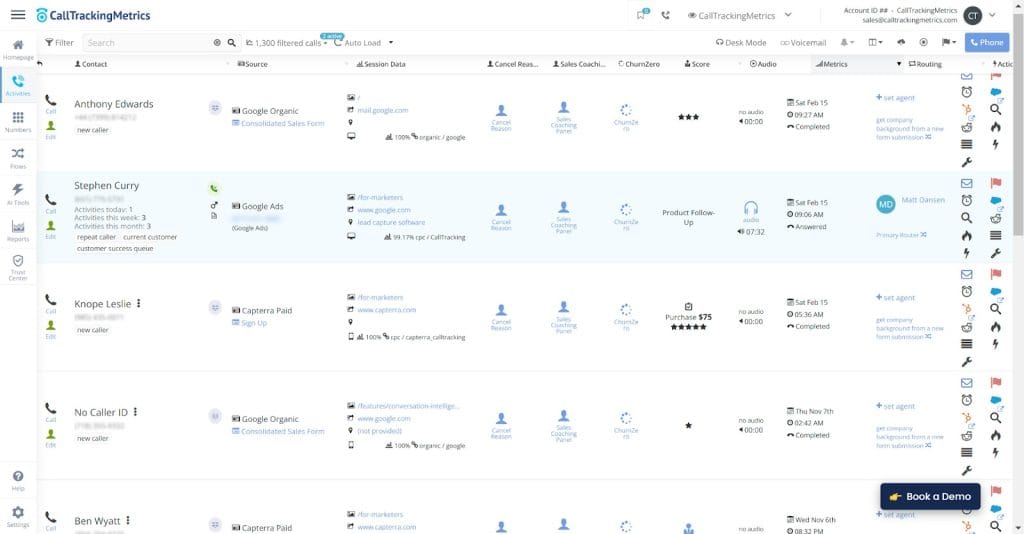
CallTrackingMetrics delivers unified tracking across calls, texts, forms, and chat interactions for complete conversation attribution.
Key Strengths:
- Cross-channel tracking unifying various communication methods
- Advanced call routing and distribution logic
- Real-time dashboard with conversion reporting
- Automated tagging based on conversation content
- Integration with major advertising platforms
CallTrackingMetrics captures every customer touchpoint regardless of communication channel. The platform reveals which campaigns drive actual conversations, automatically scoring and categorizing interactions based on content analysis. Agency teams gain immediate insight into which marketing efforts generate quality engagements.
Considerations: The comprehensive feature set creates steeper learning requirements. Cost increases with call volume, potentially creating scaling challenges for high-volume clients.
Ideal for: Full-service agencies needing complete attribution across multiple communication channels beyond just phone calls.
Take a look at our best call tracking software list to see why these two are on this list.
AdRoll – The Retargeting Specialist
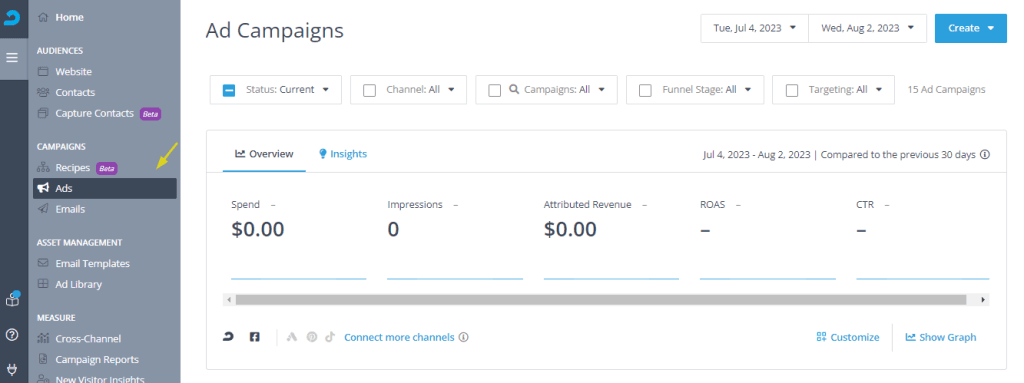
AdRoll specializes in cross-platform retargeting and audience targeting to maximize conversion opportunities.
Key Strengths:
- Cross-platform ad retargeting capabilities
- AI-powered audience segmentation
- Brand awareness and conversion campaign tools
- Unified dashboard for cross-channel performance
- Email marketing integration for multi-touch campaigns
AdRoll transforms website visitors into customers through sophisticated retargeting across web, social, and email channels. The platform’s AI analyzes user behavior to identify high-potential segments and optimal targeting moments. Dynamic ad creation tools automatically generate personalized creative variations at scale.
Considerations: Cookie restrictions in modern browsers require adaptation of tracking strategies. Peak performance requires significant historical data, creating ramp-up periods for new accounts.
Ideal for: Performance-focused agencies seeking to improve conversion rates through targeted remarketing and audience segmentation.
Check out our full breakdown of the best PPC reporting tools article.
PR Tools – Building Brand Reputation
Modern public relations extends beyond press releases into comprehensive reputation management. Discover specialized tools helping agencies develop strategic PR campaigns across multiple channels.
BuzzStream – The Outreach Manager
BuzzStream specializes in relationship management for digital PR and link building initiatives.
Key Strengths:
- Extensive influencer and publisher database
- Email template library with tracking capabilities
- Contact relationship history accessible across team members
- Discovery tools identifying relevant industry contacts
- Link monitoring with performance metrics
BuzzStream streamlines outreach processes, helping teams find appropriate contacts and track engagement throughout campaigns. The relationship management features preserve institutional knowledge even through staff changes, maintaining valuable contact histories.
Considerations: Complex campaigns face steeper learning requirements. The interface looks dated compared to newer alternatives, though functionality outweighs aesthetics.
Ideal for: Agencies conducting regular outreach campaigns who need scalable relationship management while tracking effectiveness metrics.
Prezly – The Digital Newsroom
Prezly provides a specialized platform for modern press release creation and media resource distribution.
Key Strengths:
- Customizable brand newsrooms and digital media centers
- Media relationship CRM built for PR workflows
- Multimedia press release creation tools
- Email distribution with engagement analytics
- Coverage monitoring and clipping services
Prezly modernizes press release strategy, creating digital-first content resonating with today’s journalists. The newsroom features give media contacts self-service access to relevant information and assets, increasing coverage opportunities.
Considerations: The digital-first approach works best for agencies already embracing contemporary PR methods. Integration with traditional media databases sometimes requires additional tools.
Ideal for: Forward-thinking PR agencies transitioning beyond standard press release distribution toward compelling digital media hubs.
PR.co – The Campaign Manager
PR.co delivers comprehensive tools for managing complete PR campaign lifecycles.
Key Strengths:
- Campaign planning and strategy management
- Team collaboration on content creation
- Media contact database with relationship tracking
- Result monitoring and coverage reporting
- Client approval systems with permission controls
PR.co structures the entire PR workflow from initial strategy through execution and measurement. The collaborative features provide exceptional value for agencies whose clients require approval at various campaign stages.
Considerations: The smaller user community means fewer templates and shared resources compared to market leaders. Customization options occasionally present limitations for highly specialized needs.
Ideal for: Mid-sized PR agencies seeking structured systems for the entire campaign process from planning to results reporting.
Presspage – The Press Release Specialist
Presspage focuses exclusively on creating and distributing press releases that generate measurable results.
Key Strengths:
- Multimedia press release creation tools
- SEO optimization for media materials
- Multi-channel distribution capabilities
- Performance analytics for release assessment
- Media contact management system
Presspage transforms traditional text releases into multimedia assets performing effectively across digital channels. The platform’s analytics provide clear insights into press material performance, helping agencies demonstrate concrete value to clients.
Considerations: The narrow press release focus means most agencies need additional tools for comprehensive PR management. Some features duplicate functionality in broader marketing platforms.
Ideal for: Agencies heavily invested in press release creation who want to modernize this aspect of their PR strategy.
Muck Rack – The Media Intelligence Platform
Muck Rack combines journalist database capabilities with extensive media monitoring functionality.
Key Strengths:
- Comprehensive journalist profiles with detailed specialization data
- Real-time media monitoring across news and social platforms
- Custom alert system for client mentions
- Relationship tracking throughout outreach campaigns
- PR impact measurement and coverage reporting
Muck Rack delivers powerful insights into media coverage patterns and journalist preferences, enabling precise outreach targeting. The monitoring capabilities ensure teams never miss relevant client coverage or time-sensitive opportunities.
Considerations: Premium pricing positions this tool at the higher end of PR platform costs. Specialized industries occasionally show less comprehensive coverage than mainstream sectors.
Ideal for: Larger PR agencies managing multiple client campaigns requiring comprehensive media intelligence and relationship management from a unified platform.
Link Building Tools – SEO’s Critical Component
Quality backlinks remain fundamental to SEO success. These specialized tools help agencies build authoritative link profiles efficiently and at scale.
Majestic SEO – The Link Intelligence Tool
Majestic provides detailed metrics and analytical insights focused specifically on backlink quality and patterns.
Key Strengths:
- Proprietary Trust Flow and Citation Flow quality measurements
- Comprehensive historical index tracking link profile development
- Detailed anchor text distribution analysis
- Competitive backlink comparison tools
- Link context and neighborhood quality assessment
Majestic delivers sophisticated link quality metrics extending far beyond simple quantity counts. The historical data proves particularly valuable for understanding link profile evolution over time and identifying patterns in successful acquisition strategies.
Considerations: The interface lacks the modern design of newer alternatives. The proprietary metrics require initial learning investment to interpret correctly.
Ideal for: SEO agencies specializing in technical link analysis who need detailed quality metrics beyond standard SEO platform capabilities.
Pitchbox – The Outreach Automation Platform
Pitchbox transforms link building outreach into a scalable, repeatable process through automation and workflow management.
Key Strengths:
- Automated prospect identification and contact discovery
- Personalized outreach sequence creation
- Intelligent follow-up scheduling and management
- Team collaboration with task assignment
- Performance tracking with conversion analytics
Pitchbox converts link building into a structured, measurable process. The automation features dramatically increase efficiency, enabling agencies to scale outreach efforts without corresponding time increases while maintaining personalization quality.
Considerations: The efficiency focus requires careful management to avoid sacrificing relationship quality. The platform represents a significant investment specialized exclusively for link acquisition.
Ideal for: Agencies with dedicated link building teams needing to scale outreach operations efficiently while maintaining personalization and quality standards.
Check out our full breakdown of the best link building tools.
Project Management and Client Collaboration Tools
Efficient agency operations demand robust project management and client collaboration tools. Discover the platforms helping leading agencies streamline workflows and improve client relationships.
ClickUp – The Versatile Project Management Solution
ClickUp offers a highly customizable project management platform adapting to diverse agency workflows and team structures.
Key Strengths:
- Fully customizable workflows and information views
- Integrated time tracking and resource allocation
- Collaborative document creation and editing
- Client portal options for transparent progress sharing
- Extensive integration ecosystem connecting essential tools
ClickUp adapts to virtually any agency work style through its exceptional flexibility. The platform accommodates everything from agile marketing campaigns to traditional client retainers, with customizable views allowing team members to access information in their preferred formats.
Considerations: The extensive customization options require initial setup investment. The mobile experience provides less functionality than the desktop version.
Ideal for: Agencies seeking a central platform unifying project management, documentation, and team collaboration under a single system.
Asana – The Workflow Specialist
Asana delivers structured project management with exceptional workflow clarity and accountability tracking.
Key Strengths:
- Intuitive interface requiring minimal onboarding
- Advanced workflow automation reducing manual handoffs
- Team workload visualization preventing burnout
- Goal tracking connecting projects to strategic objectives
- Comprehensive reporting dashboards measuring progress
Asana excels at making project status immediately visible, helping agencies prevent missed deadlines and overlooked deliverables. The workflow automation features eliminate manual task transitions between team members, while workload visualization helps maintain balanced team capacity.
Considerations: The commenting and notification system sometimes creates information overload for busy team members. The structured approach provides less flexibility for non-standard project types.
Ideal for: Agencies with established processes seeking reliable systems for task management and team coordination.
Monday.com – The Visual Project Management Platform
Monday.com offers a visually oriented approach to project management that makes status and progress immediately apparent.
Key Strengths:
- Highly visual interface
- Customizable board structure
- Automation capabilities
- Client-facing dashboards
- Comprehensive app marketplace
Monday.com’s visual approach to project management makes it particularly effective for agencies managing multiple projects simultaneously. The platform’s color-coding and status indicators provide at-a-glance updates on project health, while its customizable structure adapts to various workflow types.
Considerations: Some users report that the platform can become expensive as teams grow due to its per-user pricing model. The extensive customization options require initial investment to optimize for specific agency needs.
Ideal for: Visually oriented agencies who value clear status indicators and customizable workflows.
For more options, check out our full breakdown of the best project management software for agencies.
Notion – The All-in-One Workspace
Notion combines note-taking, project management, and knowledge base capabilities in a single platform.
Key Strengths:
- Flexible structure that combines multiple tool types
- Powerful database capabilities
- Knowledge base and documentation features
- Collaborative editing
- Customizable templates
Notion’s flexibility makes it particularly valuable for agencies that want to consolidate multiple tools into a single platform. The ability to create custom databases, documentation, and project trackers within the same space reduces context switching and improves information accessibility.
Considerations: Notion’s open-ended nature means it requires more setup than purpose-built project management tools. Some users report performance issues with very large workspaces.
Ideal for: Agencies looking to reduce tool sprawl by combining project management, documentation, and knowledge sharing in a single platform.
Slack – The Team Communication Hub
Slack has established itself as the standard for team communication, replacing email for internal collaboration.
Key Strengths:
- Channel-based communication for topic organization
- Extensive integration capabilities
- Searchable message history
- Huddle feature for quick voice conversations
- Thread support for focused discussions
Slack excels at reducing email overload while keeping team communication organized and searchable. The platform’s channel structure allows for both team-wide updates and specialized discussions, while its search capabilities ensure that information remains accessible over time.
Considerations: Some users report that Slack can become a source of distraction without careful management. The platform’s conversation-based nature makes it less suitable for structured documentation and knowledge management.
Ideal for: Agencies of all sizes looking to improve team communication and reduce email dependence.
HubSpot – The Client Relationship Management Platform
HubSpot offers a comprehensive CRM platform with marketing, sales, and service capabilities.
Key Strengths:
- Unified customer data across marketing and sales
- Marketing automation capabilities
- Client portal options
- Email marketing integration
- Comprehensive reporting
HubSpot stands out for its ability to track the entire client journey, from initial contact through ongoing relationship management. The platform’s marketing tools are particularly valuable for agencies, with email marketing, social media, and content management capabilities built in.
Considerations: HubSpot’s full suite represents a significant investment, with costs increasing as features are added. Some users report that certain specialized features lack the depth of dedicated tools.
Ideal for: Full-service agencies looking to align marketing, sales, and client service around a central platform.
Salesforce – The Enterprise Relationship Platform
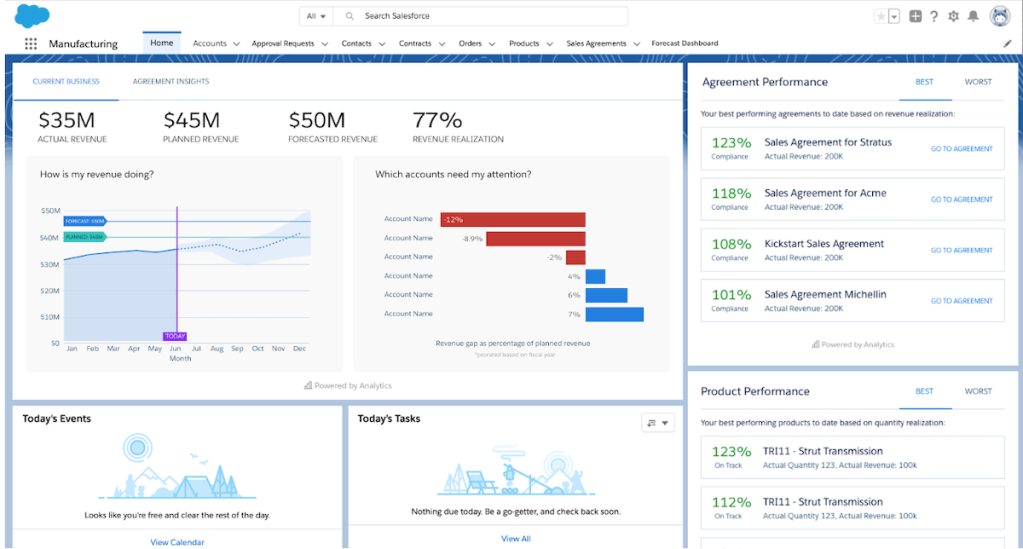
Salesforce provides a comprehensive client relationship management ecosystem designed for complex agency-client engagements.
Key Strengths:
- End-to-end client lifecycle management
- Customizable workflow automation
- Advanced opportunity tracking and forecasting
- Deep analytics with AI-powered insights
- Extensive integration capabilities with marketing tools
Salesforce creates a unified client view from initial contact through ongoing service delivery. The platform enables sophisticated automation of complex agency processes while providing granular visibility into team performance and client status. Custom dashboards deliver executive-level insights alongside operational metrics for complete agency intelligence.
Considerations: Implementation requires significant configuration and possible customization. The extensive feature set demands dedicated administration resources to maximize value.
Ideal for: Larger agencies with complex client relationships seeking an enterprise-grade platform for complete business operations management.
Analytics and Reporting Tools
Demonstrating value to clients requires robust analytics and reporting tools. Here are the platforms helping agencies translate data into compelling client stories.
Google Analytics 4 – The Essential Analytics Platform
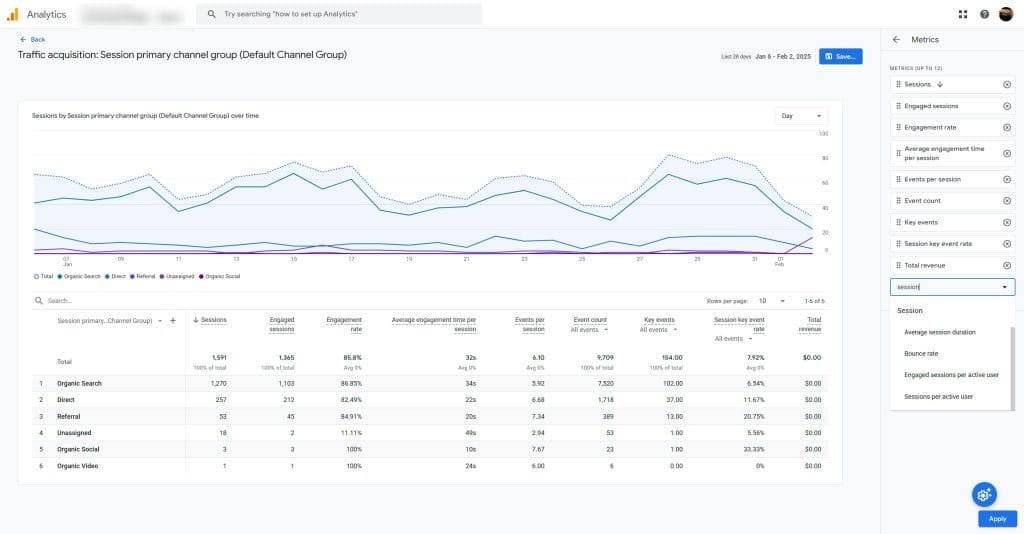
Google Analytics 4 provides the foundation for website and app performance analysis.
Key Strengths:
- Cross-platform tracking (web and app)
- Event-based data model
- Advanced AI-powered insights
- Enhanced privacy features
- Integration with Google’s marketing ecosystem
GA4 represents a significant evolution in analytics, focusing on user journeys across platforms rather than isolated sessions. The platform’s event-based model provides more flexibility in tracking user interactions, while its AI capabilities surface insights that might otherwise be missed.
Considerations: The transition from Universal Analytics to GA4 involves a learning curve, with significant changes to both data models and interface. Some users report that certain reports are less intuitive than in previous versions.
Ideal for: All agencies involved in digital marketing, as GA4 provides the foundation for understanding online performance.
Want more analytics options for your clients? Read our best marketing analytics tools.
Google Data Studio (now Looker Studio) – The Visualization Tool
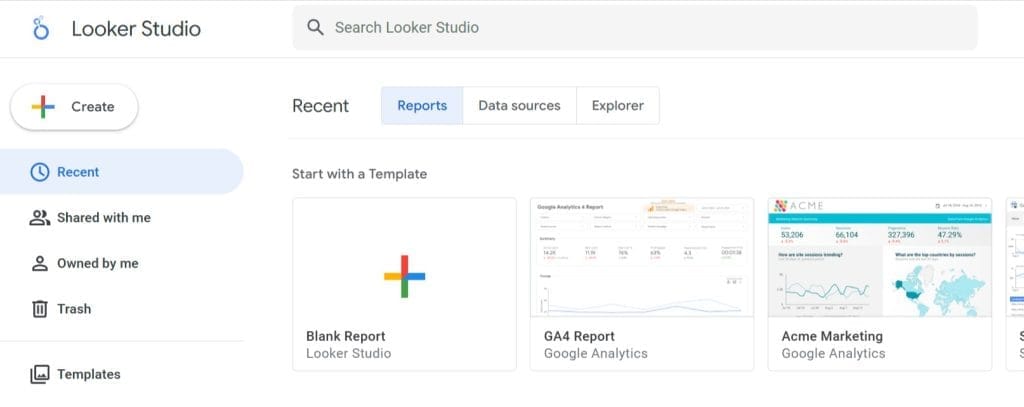
Looker Studio (formerly Google Data Studio) transforms raw data into visual reports and dashboards.
Key Strengths:
- Visual report creation without coding
- Connection to multiple data sources
- Interactive dashboard capabilities
- Sharing and collaboration features
- Extensive template library
Looker Studio excels at making data accessible and understandable, turning complex metrics into visual stories. The platform’s ability to combine data from multiple sources allows agencies to create comprehensive client dashboards that showcase performance across channels.
Considerations: Advanced customization can require workarounds, and some data sources require third-party connectors. The platform occasionally experiences performance issues with very large datasets.
Ideal for: Agencies of all sizes looking to create visually compelling reports and dashboards for client presentations.
Tableau – The Advanced Data Analysis Platform
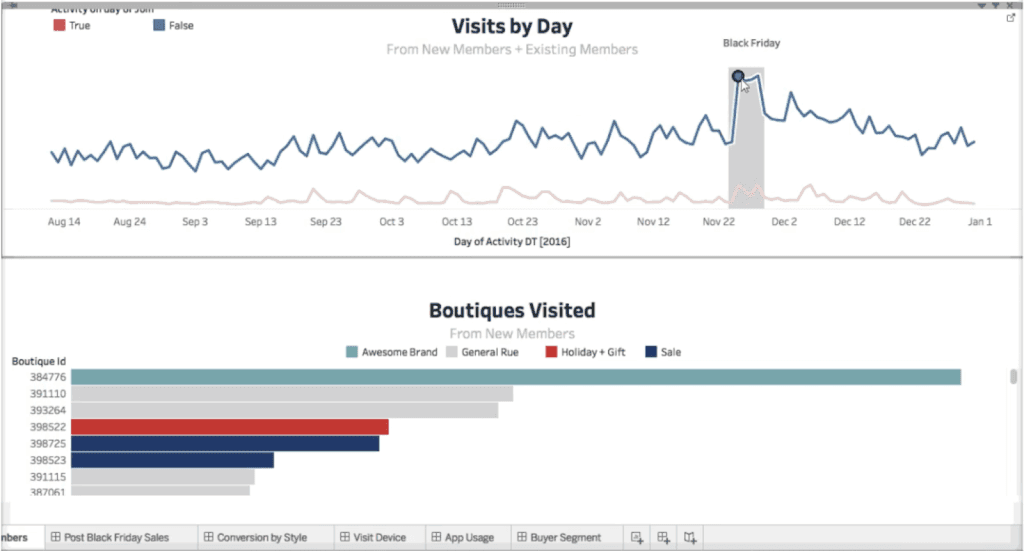
Tableau offers powerful data visualization and analysis capabilities for agencies with complex reporting needs.
Key Strengths:
- Advanced data visualization options
- Complex data analysis capabilities
- Interactive dashboard features
- Enterprise-grade security
- Desktop and cloud options
Tableau excels at handling complex data analysis requirements, making it particularly valuable for agencies working with large datasets or sophisticated analysis needs. The platform’s visualization capabilities go beyond standard charts, allowing for compelling data storytelling.
Considerations: Tableau has a steeper learning curve than some alternatives and represents a significant investment, with desktop licenses starting at $70/month per user. The platform’s power comes with complexity that can be overwhelming for basic reporting needs.
Ideal for: Larger agencies with data analysis specialists who need advanced visualization and analysis capabilities.
Power BI – The Microsoft Analytics Solution
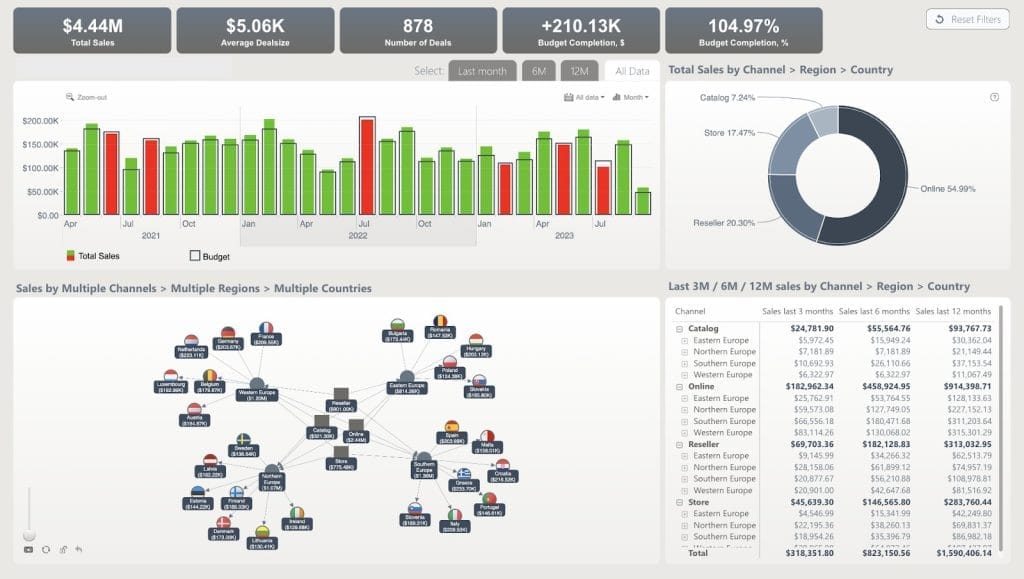
Power BI offers robust data analysis and visualization within the Microsoft ecosystem.
Key Strengths:
- Deep integration with Microsoft products
- Advanced data modeling capabilities
- AI-powered insights
- Both desktop and web interfaces
- Regular feature updates
Power BI stands out for its integration with the Microsoft ecosystem, making it particularly valuable for agencies already using Microsoft’s tools. The platform’s data modeling capabilities are especially strong, allowing for complex analysis without requiring SQL knowledge.
Considerations: Like Tableau, Power BI has a learning curve for advanced features. Some users report that the web version lacks certain capabilities available in the desktop application.
Ideal for: Agencies working within the Microsoft ecosystem who need powerful data analysis and visualization capabilities.
Email Marketing and Automation Tools
Email remains one of the most effective marketing channels, and automation extends its power. Here are the platforms helping agencies deliver impactful email campaigns.
Mailchimp – The Email Marketing Standard
Mailchimp has evolved from a simple email platform to a comprehensive marketing automation tool.
Key Strengths:
- User-friendly email builder
- Customer journey mapping
- Marketing automation capabilities
- E-commerce integration
- Content optimization suggestions
Mailchimp excels at making email marketing accessible while offering depth for sophisticated campaigns. The platform’s journey builder allows for complex automation sequences, while its testing features help optimize content for better performance.
Considerations: Pricing can increase significantly as subscriber lists grow. Some users report limitations in certain advanced features compared to dedicated automation platforms.
Ideal for: Agencies managing email marketing for clients who need a balance of accessibility and capabilities.
ActiveCampaign – The Automation Specialist
ActiveCampaign focuses on sophisticated marketing automation across email and other channels.
Key Strengths:
- Advanced automation capabilities
- CRM functionality
- Predictive sending features
- Split testing capabilities
- Extensive integration options
ActiveCampaign stands out for its powerful automation engine, which allows for complex, condition-based sequences that respond to user behavior. The platform’s CRM functionality helps bridge the gap between marketing and sales, making it valuable for full-funnel campaigns.
Considerations: The platform’s depth comes with a steeper learning curve than some alternatives. Some users report that the email builder is less intuitive than dedicated email platforms.
Ideal for: Agencies focused on marketing automation who need sophisticated behavioral targeting capabilities.
HubSpot Marketing Hub – The Integrated Marketing Platform
HubSpot Marketing Hub offers email marketing and automation as part of its broader marketing platform.
Key Strengths:
- Integration with HubSpot CRM
- Content management capabilities
- Multi-channel campaign tools
- Comprehensive analytics
- ABM features for B2B marketing
HubSpot Marketing Hub excels at connecting email campaigns with broader marketing efforts, providing a unified view of performance and customer interactions. The platform’s content tools are particularly strong, with blogging, social media, and SEO capabilities alongside email marketing.
Considerations: The full platform represents a significant investment, particularly as advanced features are added. Some users report that certain specialized features lack the depth of dedicated tools.
Ideal for: Agencies looking for an integrated marketing platform that connects email with other channels and customer data.
Klaviyo – The E-commerce Email Specialist
Klaviyo focuses specifically on email marketing for e-commerce, with deep integration into shopping platforms.
Key Strengths:
- E-commerce-specific features and templates
- Advanced segmentation based on purchase behavior
- Predictive analytics for customer lifetime value
- SMS marketing capabilities
- Detailed performance benchmarks
Klaviyo stands out for its focus on driving e-commerce results through email marketing. The platform’s segmentation capabilities allow for highly targeted campaigns based on purchase history, browsing behavior, and predictive metrics like customer lifetime value.
Considerations: The platform’s e-commerce focus makes it less suitable for other industries. Some users report a steeper learning curve than more general email platforms, though this comes with greater capabilities for online retailers.
Ideal for: Agencies working with e-commerce clients who need sophisticated email marketing capabilities tied directly to sales performance.
Design and Creative Tools
Visual content is increasingly important in digital marketing. Here are the tools helping agencies create compelling visual assets efficiently.
Canva – The Accessible Design Platform
Canva has democratized design, making it accessible to marketing teams without specialized design skills.
Key Strengths:
- Intuitive drag-and-drop interface
- Extensive template library
- Brand kit functionality for consistent branding
- Collaboration features
- Animated content creation
Canva excels at empowering marketing teams to create professional-looking designs without requiring extensive training. The platform’s templates provide a starting point for various content types, from social media posts to presentations, while its brand kit feature ensures consistency across assets.
Considerations: Professional designers may find Canva limiting compared to specialized design software. Some users report issues with more complex design requirements, particularly for print materials.
Ideal for: Agencies needing to produce high volumes of social media and digital content who don’t have extensive design resources.
Adobe Creative Cloud – The Professional Creative Suite
Adobe Creative Cloud remains the industry standard for professional design and creative work.
Key Strengths:
- Comprehensive suite of specialized applications
- Professional-grade capabilities
- Integration between applications
- Regular feature updates
- Industry standard status
Adobe’s suite of applications covers every aspect of creative work, from image editing (Photoshop) and vector graphics (Illustrator) to video production (Premiere Pro) and publication design (InDesign). The integration between applications streamlines workflows, allowing assets to move seamlessly between different stages of the creative process.
Considerations: Creative Cloud represents a significant investment, with subscription costs adding up across multiple applications. The professional-grade tools have steeper learning curves than alternatives like Canva, requiring dedicated training for effective use.
Ideal for: Agencies with dedicated design teams who need professional-grade creative capabilities across multiple media types.
Figma – The Collaborative Design Platform
Figma has revolutionized design workflows by moving the entire process to the cloud with real-time collaboration.
Key Strengths:
- Real-time collaborative editing
- Prototyping capabilities
- Design system management
- Vector editing tools
- Developer handoff features
Figma excels at streamlining the design process, allowing multiple team members to work on designs simultaneously. The platform’s prototyping features make it easy to create interactive mockups of websites and applications, while its developer handoff tools smooth the transition from design to implementation.
Considerations: Some users report that certain specialized features found in desktop applications are missing or limited. The cloud-based nature of the platform means internet connectivity is required for full functionality.
Ideal for: Agencies with collaborative design workflows who need to streamline the process from concept to implementation.
Loom – The Video Communication Tool
Loom simplifies video communication, making it easy to create and share screen recordings with clients and team members.
Key Strengths:
- One-click screen recording
- Automatic cloud hosting
- Drawing tools for emphasis
- Viewer analytics
- Integration with project management tools
Loom has transformed how agencies communicate internally and with clients, replacing lengthy emails with clear video explanations. The platform’s simplicity makes it accessible to everyone on the team, while its analytics show who has viewed recordings and for how long.
Considerations: Free plans have limitations on video length and storage. Some users report occasional quality issues, particularly with longer recordings or complex screen activities.
Ideal for: Agencies looking to improve client communication and internal knowledge sharing through video.
AI and Automation Tools
AI is transforming marketing agency operations, automating routine tasks and enhancing creative capabilities. Here are the AI tools making the biggest impact on agency workflows.
ChatGPT (OpenAI) – The AI Assistant
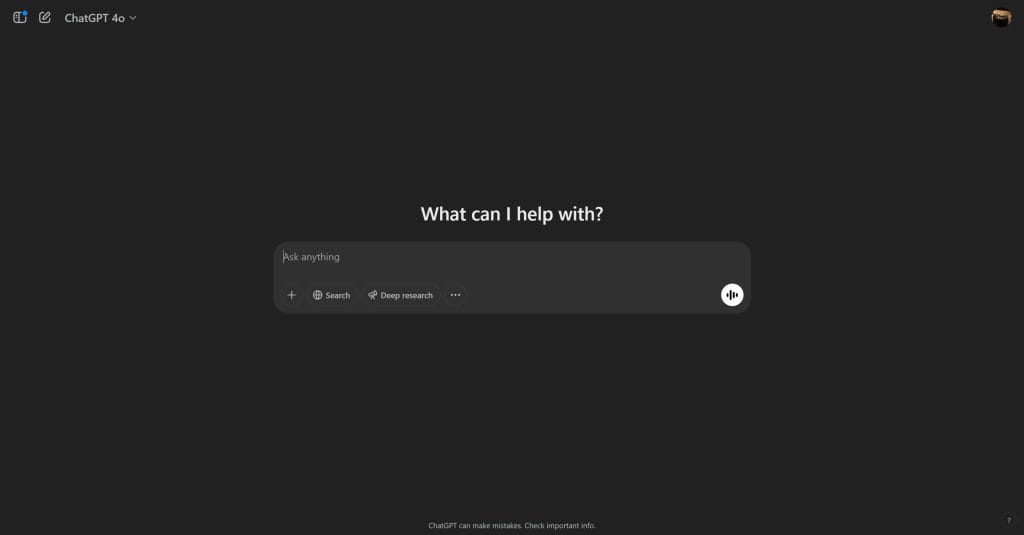
ChatGPT offers AI-powered content assistance for various marketing tasks, from copywriting to research.
Key Strengths:
- Natural language generation capabilities
- Research assistance
- Content ideation
- Draft creation for various content types
- Ability to understand context and nuance
ChatGPT excels at accelerating content creation processes, generating drafts that can be refined by human writers. The platform’s ability to understand context and respond to specific instructions makes it particularly valuable for agencies juggling multiple client voices and industries.
Considerations: Output requires human review and refinement for brand voice consistency and factual accuracy. Some users report that the model occasionally “hallucinates” or invents information when unsure.
Ideal for: Agencies looking to streamline content creation processes while maintaining human oversight for quality and brand alignment.
Jasper – The Marketing-Focused AI Platform
Jasper offers AI content creation tools specifically designed for marketing use cases.
Key Strengths:
- Templates for common marketing content types
- Brand voice customization
- Team collaboration features
- SEO integration
- Multi-language support
Jasper stands out for its focus on marketing-specific content types, with templates for everything from social media posts to email campaigns. The platform’s brand voice features help maintain consistency across AI-generated content, while its team capabilities allow for collaborative workflows.
Considerations: Like all AI writing tools, output requires human review and editing. Some users report that longer-form content can lack coherence without significant guidance and editing.
Ideal for: Marketing agencies looking to scale content production while maintaining quality and brand consistency.
Midjourney – The AI Image Generator
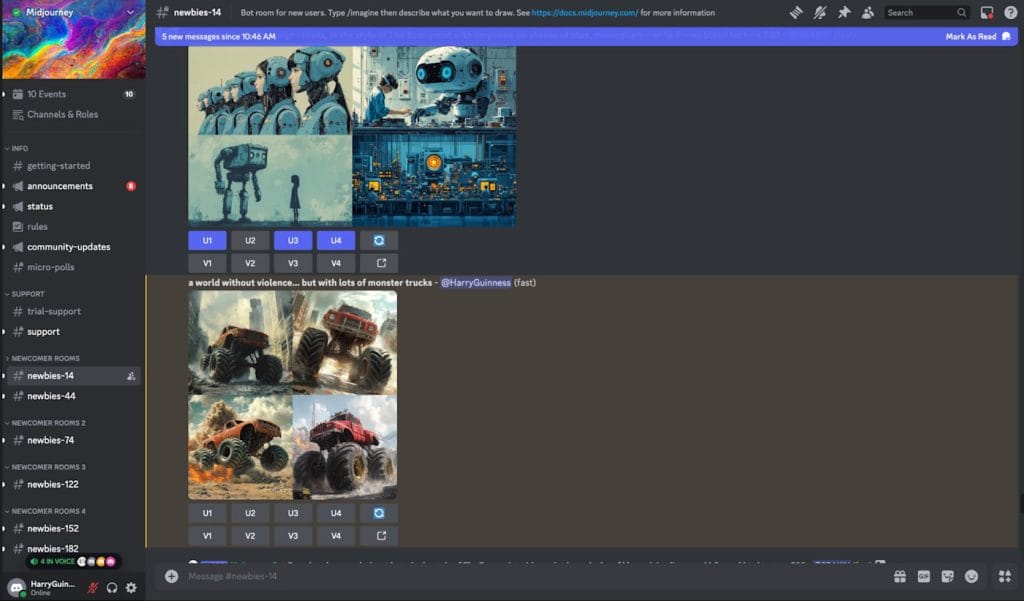
Midjourney generates high-quality images from text descriptions, opening new possibilities for visual content creation.
Key Strengths:
- High-quality image generation from text prompts
- Unique artistic styles and approaches
- Rapid iteration capabilities
- Community learning resources
- Regular model improvements
Midjourney excels at creating distinctive visual content for marketing campaigns, particularly when unique or conceptual images are needed. The platform’s ability to generate multiple variations allows for rapid exploration of visual directions without extensive design resources.
Considerations: Generated images may require refinement in traditional design tools for specific brand requirements. Some styles and concepts are more successful than others, requiring experimentation with prompt engineering.
Ideal for: Agencies looking to expand their visual content capabilities without increasing design headcount, particularly for conceptual or illustrative work.
Zapier – The Workflow Automation Platform
Zapier connects disparate applications to create automated workflows without requiring development resources.
Key Strengths:
- Connections to 5,000+ applications
- No-code automation building
- Multi-step workflow creation
- Scheduling and conditional logic
- Error handling and notifications
Zapier excels at eliminating repetitive manual tasks across marketing tools, from transferring leads between platforms to posting content across multiple channels. The platform’s no-code approach makes it accessible to non-technical team members, allowing anyone to build time-saving automations.
Considerations: Complex automations can become expensive on higher-tier plans. Some integrations have limitations in the specific actions and data fields available.
Ideal for: Agencies looking to improve efficiency by automating routine tasks and data transfers between marketing platforms.
Make (formerly Integromat) – The Advanced Automation Platform
Make offers more complex automation capabilities for agencies with sophisticated workflow needs.
Key Strengths:
- Visual workflow builder
- Data transformation capabilities
- Error handling and conditional logic
- API access for custom integrations
- Detailed execution history
Make stands out for its powerful data manipulation capabilities, allowing for more complex transformations than simpler automation tools. The platform’s visual approach to workflow building makes it accessible despite its advanced features, with clear visualization of data flow between applications.
Considerations: The platform’s depth comes with a steeper learning curve than simpler alternatives. Some users report that certain complex scenarios require workarounds or custom solutions.
Ideal for: Agencies with complex automation needs who require data transformation capabilities beyond basic application connections.
Client Acquisition and Sales Tools
Sustainable agency growth requires effective tools for lead generation, proposal creation, and client acquisition. Here are the platforms helping agencies win new business.
Pipedrive – The Agency Sales CRM
Pipedrive delivers a sales-focused CRM designed specifically for visualizing and optimizing the client acquisition process.
Key Strengths:
- Visual sales pipeline with drag-and-drop deal management
- Automated activity tracking and follow-up reminders
- Email integration with open and response tracking
- Sales forecasting and goal setting tools
- Mobile app for on-the-go prospect management
Pipedrive transforms chaotic agency sales processes into structured, measurable workflows. The visual pipeline shows exactly where each prospect stands, while automation ensures consistent follow-up without manual tracking. The platform highlights which actions move deals forward, enabling teams to replicate successful patterns.
Considerations: The platform focuses exclusively on sales rather than marketing or service delivery. Some advanced automation features require higher-tier subscriptions.
Ideal for: Agencies seeking a dedicated sales management tool with clear pipeline visibility and structured follow-up processes.
Proposify – The Proposal Management System
Proposify streamlines the creation, delivery, and tracking of client proposals and contracts.
Key Strengths:
- Template-based proposal creation
- Electronic signature capabilities
- Proposal analytics and tracking
- Content library for reusable sections
- Integration with CRM platforms
Proposify excels at turning the proposal process into a competitive advantage, with professional templates and interactive elements that showcase agency capabilities. The platform’s analytics show how prospects engage with proposals, providing valuable insights into what resonates with potential clients.
Considerations: Some users report limitations in design flexibility compared to creating custom PDF proposals. The platform represents an additional cost in the new business process.
Ideal for: Agencies looking to streamline proposal creation and improve conversion rates through professional presentation and prospect insights.
DocuSign – The Document Management Leader
DocuSign delivers enterprise-grade document management and electronic signature capabilities for client agreements.
Key Strengths:
- Legal-binding electronic signature technology with global compliance
- Document template library for standardized agreements
- Advanced workflow automation for approval processes
- Integration with CRM and accounting platforms
- Robust security and authentication protocols
DocuSign transforms agency agreement processes from proposal through signed contract. The platform eliminates paper-based workflows while providing unmatched security and compliance features. Real-time tracking shows exactly where clients stand in the review and signature process.
Considerations: The platform focuses primarily on document execution rather than visually impressive proposal design. Enterprise-level features command premium pricing compared to simpler alternatives.
Ideal for: Agencies requiring legally-compliant document processes and approval workflows, particularly those dealing with regulated industries or complex agreement structures.
Calendly – The Scheduling Automation Tool
Calendly eliminates the back-and-forth of scheduling by allowing clients and prospects to book time directly on agency calendars.
Key Strengths:
- Automated scheduling based on availability
- Custom booking questions for qualification
- Meeting reminders and follow-ups
- Integration with video conferencing platforms
- Team scheduling capabilities
Calendly excels at removing friction from the meeting scheduling process, allowing prospects to book time without multiple emails. The platform’s custom questions provide valuable information before meetings, while its reminders reduce no-shows.
Considerations: Some users report that the platform’s branding options are limited on lower-tier plans. The team scheduling features require higher-tier subscriptions.
Ideal for: Agencies looking to streamline the scheduling process for sales calls and client meetings while maintaining control over availability.
How to Build the Optimal Agency Tech Stack
With so many specialized tools available, building the right technology stack for your agency requires careful consideration of your specific needs, client base, and operational approach. Here are key principles to guide your decisions:
Focus on Integration
Choose tools that work well together, either through native integrations or platforms like Zapier. Siloed data creates inefficiency and reduces the effectiveness of your marketing efforts. Prioritize platforms that share data seamlessly, allowing for comprehensive reporting and analysis.
Balance Depth and Accessibility
The most powerful tools often have the steepest learning curves. Consider both the capabilities you need and the expertise of your team. In some cases, a slightly less powerful but more accessible tool will deliver better results by enabling broader adoption across your agency.
Consider Client Visibility
Tools with strong client-facing capabilities, such as customizable dashboards and white-label options, can strengthen relationships and demonstrate value more effectively. Prioritize platforms that make your work visible and understandable to clients in ways that align with their goals.
Plan for Scalability
Select tools that can grow with your agency, both in terms of client volume and service offerings. Platforms with tiered pricing and modular capabilities allow you to add functionality as needed without overinvesting initially.
Evaluate Total Cost of Ownership
Look beyond subscription costs to consider implementation, training, and ongoing management requirements. A more expensive tool that saves significant time or enables new service offerings may deliver better ROI than a cheaper alternative with limited capabilities.
Conclusion
Your tech stack’s make-or-break, isn’t it? Get it right, and you’re crushing it, with efficiency soaring, clients raving, and growth locked in. Mess it up, and you’re stuck in the weeds, losing ground. Picking tools that fit your grind, from your team to your clients to your vision, turns hustle into horsepower. You’re not just surviving; you’re building an edge.
This landscape’s wild and shifting, but the basics hold: sync your tools, match power to skill, shine for clients, scale smart, and chase real ROI. It’s less about collecting gadgets and more about stacking wins, with efficiency that frees you and capabilities that land deals. The best agencies treat tech like a weapon, always tweaking, always testing against what’s new and what’s coming.
You’ve got the rundown now: tools for every fight, principles to pick them. Keep it strategic, keep it tight, and you’ll thrive in this crazy game.
Build a tech stack that wins clients and drives growth. Simplify your reporting today.
Start Your Free Trial Now